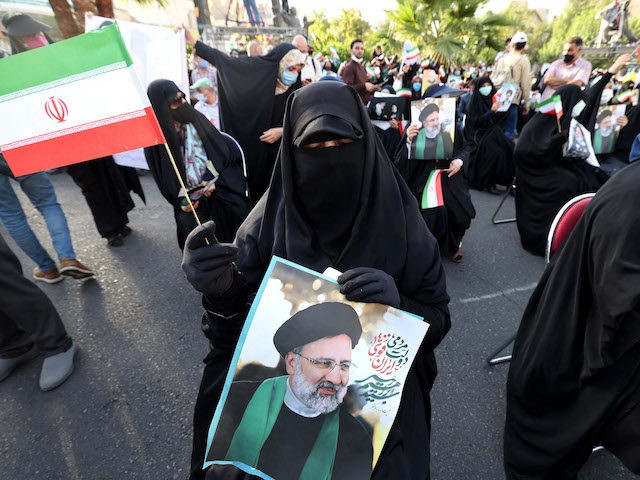Iranian Supreme Leader Ayatollah Ali Khamenei gave an address to the nation on Wednesday in which he pleaded with Iranians to vote in this weekend’s presidential election.
Khamenei fretted that low turnout would help the West challenge the legitimacy of the Iranian government, going as far as suggesting foreign powers were conspiring to depress the vote.
Iran’s state PressTV quoted from Khamenei’s anxious get-out-the-vote effort:
He said American and English media, together with their “mercenaries,” had been attempting to drive a wedge between the Iranian people and establishment by trying to discourage people from participating in the presidential election “because staying away from elections is staying away from the establishment.”
[…]
The Leader said elections should be viewed as being beyond factional politics and political leanings, calling participation in elections “an act of virtue.”
Ayatollah Khamenei said a high turnout in elections meant that the establishment has popular support, which he said would have a “unique impact” on Iran’s might internationally. He said Iran’s enemies sought to discourage participation in elections because they knew that if Iran’s establishment did not have people’s support, they would be able to destabilize the country.
Iranians have plenty of reasons not to be excited about the election. Three of the candidates dropped out on Wednesday, leaving only four to choose from, since under Iran’s absurd system 99 percent of prospective candidates are pre-emptively disqualified by the theocratic Guardian Council.
Two of Wednesday’s dropouts were “hardliners,” fueling public suspicions that the fix was in for frontrunner Ebrahim Raisi all along. According to PressTV polling, Raisi sits at 57.3 percent support among what U.S. pollsters would call “likely voters” going into the election, giving him a cushy 51 percent lead over his nearest rival, Mohsen Rezaei – another hardliner and veteran of Iran’s terrorist Islamic Revolutionary Guard Corps (IRGC).
Rezaei went into the race as something of a joke figure, a perennial candidate humorously compared to American ballot barnacle Harold Stassen by the Atlantic Council in May. To put it mildly, the 2021 Iranian presidential race was never much of a nail-biter.
As Khamenei grudgingly acknowledged, many Iranians are displeased with their government and not inclined to participate in a purely theatrical vote. The more energetic corners of the Iranian resistance hope for low turnout to send precisely the message of lost confidence that Khamenei fears.
“In recent weeks, the people of Iran have ‘welcomed’ Raisi’s candidacy by ripping and burning his posters across Iran,” the resistance group People’s Mojahedin Organization of Iran (PMOI) said on Wednesday.
PMOI noticed a good deal of anxiety in regime-friendly media about a “mass boycott of elections,” including some hysterical accusations that merely mentioning the indications of low turnout gets Iranian election officials smeared as foreign collaborators:
After Jamal Orf, the head of the election’s staff, declared on Tuesday that voter turnout would be around 37-47 percent, the regime’s state-run media reacted by warning against acknowledging a low voter turnout.
In this regard, Tasnim New Agency, which is run by the IRGC, wrote on Wednesday, “Jamal Orf, the chief of staff of national elections declared yesterday in a press briefing that based on polls, 37-47 percent of the people will participate in the June 18 election. These remarks by the chief of staff of the elections are irresponsible and shocking because foreign media and opposition groups are trying to dissuade the voter turnout.”
The warning comes while there’s widespread campaign inside Iran in which many people are declaring their utter contempt for the regime and their intention to boycott the elections. Even a poll from the state-run Iranian Student Polling Agency puts turnout on track to be the lowest since the 1979 Revolution.
As PMOI pointed out, disdain for Raisi is personal for many Iranians since he has a long history of participating in brutal crackdowns – from the massacre of 30,000 political prisoners in 1988 to a grisly wave of executions and torture during his recent tenure as head of the judiciary.
Raisi tried to build a little populist credibility for himself after he lost the previous election to Hassan Rouhani in 2017, posing as a champion of hardscrabble Iranians left behind by Rouhani’s economic policies. His lead from the early days of the current campaign has been attributed to lingering displeasure with Rouhani’s performance and with his purportedly “moderate” wing of Iranian politics. The low turnout shaping up for Friday’s vote contrasts sharply with early polls that said Iranians were keenly interested in the first post-pandemic presidential contest.
One of the disqualified 2021 candidates, former president and fiery populist Mahmoud Ahmadinejad, challenged the legitimacy of the Iranian election in an interview with CNBC on Thursday and said he would not participate in the vote, an attitude that could depress turnout among his considerable following.
“Any decision that prevents the people from influencing the outcome is against the spirit of the revolution and the constitution,” Ahmadinejad said of his disqualification.
“I made it clear on the day that I announced my candidacy that I will not participate in the elections if the will of millions of people is denied for no legitimate reason like it has been in the past,” he said.

COMMENTS
Please let us know if you're having issues with commenting.